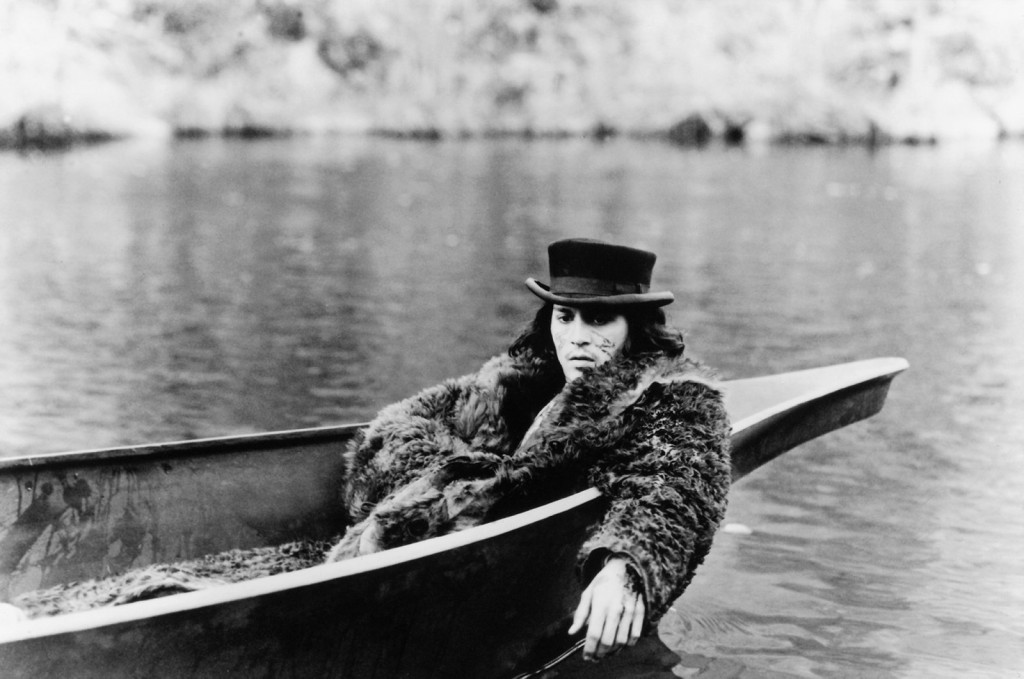By: Addison Wylie
In Dead Man, Johnny Depp plays William Blake, an accountant removed from society twice over. The loss of his parents has his mind aimlessly wandering and a new job in the West has Blake feeling further alienated. Then again, it would take a lot of adjusting to fit in with Machine’s homely, rugged community.
After meeting a local woman and then meeting her beau, Blake is pitted and pinned to a murder that has Machine’s good ole’ boys trying to track down the fish-out-of-water. Along William’s travels, he joins forces with a compliant Native American ominously named “Nobody” (played by Gary Farmer). “Nobody” leads Blake on an unforgettable tour of the West while keeping their presence quiet.
Dead Man was unleashed onto North American audiences in 1996. When movie goers tried to take in Jim Jarmusch’s version of a Western, it left an overall jarring aftertaste that didn’t wash out easily – a recurring pattern with Jarmusch’s body of work. Though it may not have been accepted with open arms in the 90’s, it has earned cult notoriety for its quirkiness and psychedelic take on the genre.
Personally, I feel Dead Man works best as a character study. When we see Depp trying to manoeuvre his way around crowds in a strange land and communicate with people who guffaw and gawk in his face, Depp does a great job at communicating his loss and fear. The instances when he’s paired up with the aforementioned woman are times when the audience really senses how powerful a connection can be when someone’s been without it for so long.
When Jarmusch steps away from the character driven pieces and leans more towards making a genre picture with his own peculiar stamp, we run into the same problems Jarmusch later had with Ghost Dog: The Way of the Samurai. In some ways, Ghost Dog is a repeat of Dead Man, which explains why Farmer shows up in that film as well as a mysterious man named “Nobody”.
Farmer overplays his hand as the all-knowing idol on Blake’s spiritual journey. He recites Jarmuch’s dialogue with overcompensating confidence and two-dimensional delivery. We wonder if Farmer actually knew what the filmmaker’s movie was all about. Or, if Jarmusch needed to provide more insight into his script.
We also get the sense that Jarmusch is trying hard to figure out how to apply his style to a Western. Sometimes it works, but more moments appear stilted. Loud spurts of Neil Young’s radical yet appropriate soundtrack will pipe up with little motivation, and Jarmusch can’t end a scene without fading to black.
Dead Man starts out strong enough to warrant at least one viewing. Depp’s performance is competent, and quirky turns by Crispin Glover, John Hurt, and Iggy Pop are an odd joy to watch. It’s a film that reminds us how spot-on Jarmusch can be when given characters to develop over a slow burn, and how plodding his results can become when he’s aiming to redefine a genre.
Dead Man screens at the TIFF BELL Lightbox on Saturday, August 9 at 7:00 p.m. along with a live Skype intro by Gary Farmer.
More STRANGE PARADISE Coverage:
Ghost Dog: The Way of the Samurai review
Coffee and Cigarettes review




Leave a comment